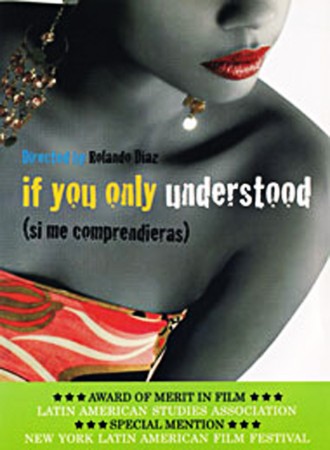
If You Only Understood 1998
Distributed by First Run/Icarus Films, 32 Court St., 21st Floor, Brooklyn, NY 11201; 800-876-1710
Produced by Rolando Diaz
Directed by Rolando Diaz
VHS, color, 87 min.
College - Adult
Latin American Studies, Multicultural Studies, Media Studies
Date Entered: 11/09/2018
Reviewed by Lori Foulke, Milton S. Eisenhower Library, Johns Hopkins UniversityThis lively video chronicles the activities of Cuban film director Rolando Diaz as he sets about planning his new film -- one which as yet has no plot, no stars, and no financial backing. We follow Diaz as he polls Cubans in the streets, asking the people to tell him what type of movie they would like to see. The resounding response -- a movie about Cuba, the real Cuba, and one which features music prominently. As a result he decides on a musical, one which will feature a real Cubana -- and thus he sets off to identify the undiscovered star of his movie -- a mulatta or black Cuban singer/dancer/actress. Sandwiched between segments of "man on the street" interviews, we are introduced to several women selected for potential roles in the planned musical, through footage of their interviews, dance rehearsals, and acting auditions.
As Diaz, his musical director, and choreographer work with these women, and sometimes visit with them and their families in their homes, the viewer begins to see glimpses of Cuban life, and the issues which make it complex and difficult: the racial politics surrounding the relative lightness/darkness of one's skin; the struggle to survive in a depressed economy, living within decrepit buildings, and with little opportunity for economic success; coping with generational conflict, broken families, separation, and emigration from Cuba; the struggle to overcome loneliness, isolation, and bitterness. As the footage continues, it dawns on the viewer that this film is not just another documentary about making a movie; rather, the "behind-the-scenes" approach allows Diaz to expose the real Cuban experience through the lives of those Cubanas living it. Most of these women are not professional actresses -- among them are a dancer, a model, an unemployed young woman, a nurse, an engineer and a food stall owner -- but their personalities, talents, stories and dreams have particular immediacy, which Diaz successfully captures on film.
Though viewers never get much of a glimpse of the "real" movie (this video ends with the director heading off to secure funding to film it), they are not left disappointed. The filming of the early stages of planning the movie captures the "real" Cuba in ways a different genre of film might not be able to.
Recommended.